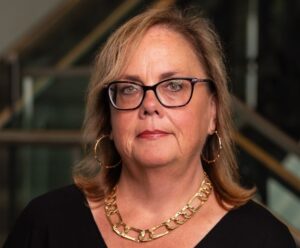By: Amanda Corbin
Victoria Cabral is a busy junior with a double major in Spanish and Computer Science who also started coursework in the Undergraduate Certificate in Universal Design (UD) program this semester. She heard about the UD program from alumna Kyra Seevers, who just this fall took a position as a software engineer at Google headquarters in Cambridge, Mass. after completing a practicum exploring the principles of UD within the space of security, trust, and safety online.
Like Kyra, Victoria also plans to do a practicum in web design and wants to use what she learns in the certificate program to develop software that is accessible for everyone. “I want to create things to help people,” she said and credits her parents and the Scouts for instilling in her a sense of service and desire to help.
Originally from Louisville, Victoria went to a large high school where she was involved in Best Buddies, a mentor program where students are paired with their peers in special education. It was also in high school that Victoria gained an interest in computer science. “I took a class on Java, and I just fell in love with it,” she said.
The undergraduate certificate in UD is offered by the Human Development Institute (HDI) and is open to students in any discipline, something Victoria described as one of the best things about the program. From majors in computer science to art to architecture, students hear diverse perspectives and learn how their peers plan to use UD in their work. “Everyone should have Universal Design [because] it can be applied to any major and day-to-day life,” Victoria said.
Universal Design is a set of strategies that promote the inclusion and participation of all people. Using UD drives innovation as creators use these principles to design products, systems, buildings, classrooms, and other environments that are accessible to everyone.
Familiar innovations such as grab bars, ramps, automatic doors, elevators, sidewalk cutouts, Siri, and online learning software—which are all tools used by everyone, regardless of ability—are examples of UD principles at work.
Victoria said she learned important lessons from day one of the first course in UD citing as one example the use of person-first language, which puts the person before their diagnosis. She went on to say, “It’s important in design to think about everyone,” and noted that being in the program reminded her “to be an advocate.”
The program consists of an intro to UD course (HDI 350), two practicums, and an elective. A limited number of stipends are available to support students enrolling in the program. But you don’t have to be in the program to take the intro course. If you are interested in UD, start by enrolling in HDI 350.
Since it began in the fall of 2017, eleven students from nine different disciplines have completed the UD certificate program. Those disciplines include Computer Science, Communication Sciences and Disorders, Economics, Human Health Sciences, Interior Design, Biology, Media Arts and Studies, Social Work, and Arts Administration.
“This certificate is the first of its kind at a Research I university,” said HDI Executive Director Dr. Kathy Sheppard-Jones. “The initial idea grew out of conversations HDI had with President Capilouto around accessibility at UK. He suggested finding a way for students to receive formal training and recognition for their efforts. Thus, the certificate was born with the great help of several champions across campus, including the College of Design.”
This innovative program teaches students to use UD practices, which leads to enhanced employability and career advancement as well as better products and environments for all people.
For more information on HDI’s Universal Design Certificate, click this link: https://hdi.uky.edu/undergraduate-certificate
The Human Development Institute is Kentucky’s Center for Excellence in Developmental Disabilities Education, Research, and Service. HDI’s vision is the full participation and contribution of all people with disabilities in all aspects of society.



